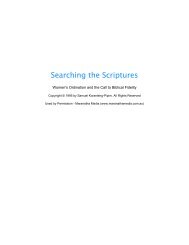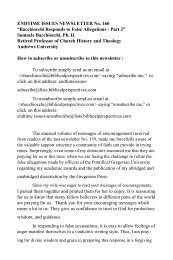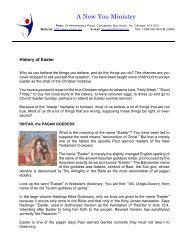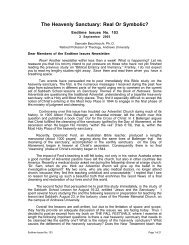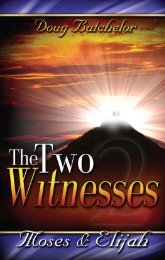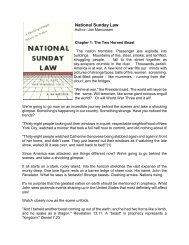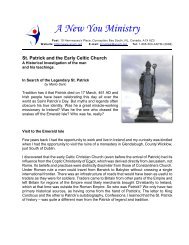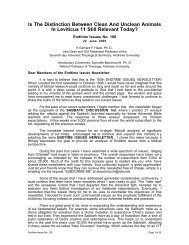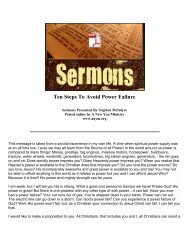Bible Readings for the Home Circleâ1914 - A New You Ministry
Bible Readings for the Home Circleâ1914 - A New You Ministry
Bible Readings for the Home Circleâ1914 - A New You Ministry
Create successful ePaper yourself
Turn your PDF publications into a flip-book with our unique Google optimized e-Paper software.
BIBLE READINGS<br />
NOTES.— These four angels are understood to refer to <strong>the</strong> four leading<br />
Turkish sultanies—Aleppo, Iconium, Damascus, and Bagdad—of<br />
which <strong>the</strong> Ottoman Empire was composed, situated in <strong>the</strong> country<br />
watered by <strong>the</strong> river Euphrates.<br />
As a striking parallel it may be noted that under <strong>the</strong> sixth plague<br />
(Rev. 16:12–16), <strong>the</strong> four angels of Rev. 7:1–3 will loose <strong>the</strong> winds of<br />
war, <strong>the</strong> waters of <strong>the</strong> river Euphrates (<strong>the</strong> Turkish Empire) will be dried<br />
up, and <strong>the</strong> armies of <strong>the</strong> nations will assemble <strong>for</strong> <strong>the</strong> battle of Armageddon.<br />
15. What warlike scene is given under this trumpet<br />
“The number of <strong>the</strong> armies of <strong>the</strong> horsemen was twice ten thousand<br />
times ten thousand: . . . and <strong>the</strong> heads of <strong>the</strong> horses are as <strong>the</strong> heads of<br />
lions; and out of <strong>the</strong>ir mouths proceedeth fire and smoke and brimstone.”<br />
Verses 16, 17, R.V.<br />
NOTES.— “In <strong>the</strong> year 1453, Mohammed II, <strong>the</strong> Great, sultan of <strong>the</strong><br />
Ottomans, laid siege to <strong>the</strong> capital [Constantinople], with an army of over<br />
200,000 men. After a short investment, <strong>the</strong> place was taken by storm. The<br />
cross, which since <strong>the</strong> time of Constantine <strong>the</strong> Great had surmounted <strong>the</strong><br />
dome of St. Sophia, was replaced by <strong>the</strong> crescent, which remains to this<br />
day.” Myers’s “General History,” edition 1902, pages 462, 463. {294<br />
294}<br />
Thus Constantinople, <strong>the</strong> eastern seat of <strong>the</strong> Roman Empire since <strong>the</strong><br />
days of Constantine, was captured by <strong>the</strong> Turks.<br />
Reference also seems to be made here to <strong>the</strong> use of firearms, which<br />
began to be employed by <strong>the</strong> Turks toward <strong>the</strong> close of <strong>the</strong> thirteenth<br />
century, and which, discharged from horseback, would give <strong>the</strong> appearance<br />
of fire and smoke issuing from <strong>the</strong> horses’ mouths. In <strong>the</strong> battle of<br />
Armageddon, to which allusion may here be made, an army of “twice ten<br />
thousand times ten thousand,” or two hundred million, will doubtless be<br />
assembled.<br />
16. What was <strong>the</strong> result of this warfare by means of “fire, and smoke,<br />
and brimstone”<br />
“By <strong>the</strong>se three was <strong>the</strong> third part of men killed.” Verse l8.<br />
NOTE.— This shows <strong>the</strong> deadly effect of this new means of warfare.<br />
“Constantinople was subdued, her empire subverted, and her religion<br />
trampled in <strong>the</strong> dust by <strong>the</strong> Moslem conquerors.” Elliott’s “Horae<br />
Apocalypticae,” Vol. I, page 484.<br />
17. What definite period is mentioned under this trumpet<br />
“And <strong>the</strong> four angels were loosed, which were prepared <strong>for</strong> an hour,<br />
and a day, and a month, and a year, <strong>for</strong> to slay <strong>the</strong> third part of men.”<br />
Verse 15.<br />
NOTE.— An hour in prophetic time is equal to fifteen days; a day stands<br />
<strong>for</strong> a year , a month <strong>for</strong> thirty years, a year <strong>for</strong> 360 years. Added toge<strong>the</strong>r,<br />
THE SEVEN TRUMPETS<br />
<strong>the</strong>se amount to 391 years and fifteen days, <strong>the</strong> time allotted <strong>for</strong> <strong>the</strong> Ottoman<br />
supremacy. Commencing July 27, 1449, <strong>the</strong> date of <strong>the</strong> close of <strong>the</strong><br />
fifth trumpet, this period would end Aug. 11, 1840. In exact fulfilment of <strong>the</strong><br />
words of inspiration, this date marks <strong>the</strong> fall of <strong>the</strong> Ottoman Empire as an<br />
independent power. His empire wasted beyond hope of recovery in a war<br />
with Mohammed Ali, pasha of Egypt, <strong>the</strong> Sultan of Turkey submitted to<br />
<strong>the</strong> dictates of <strong>the</strong> <strong>the</strong>n four great powers of Europe, and his minister, Rifat<br />
Bey, on that very day, Aug. 11, 1840, reached Alexandria, bearing, not <strong>the</strong><br />
sultan’s ultimatum, but that of <strong>the</strong> powers, to place in, <strong>the</strong> hands of <strong>the</strong><br />
rebellious pasha. Since <strong>the</strong>n Turkey has existed only by <strong>the</strong> help or sufferance<br />
of <strong>the</strong> great powers of Europe, and has commonly been referred to as<br />
“<strong>the</strong> Sick Man of <strong>the</strong> East.”<br />
18. With what announcement does <strong>the</strong> sixth trumpet close<br />
“The second woe is past; and, behold, <strong>the</strong> third woe cometh quickly.”<br />
Rev. 11:14.<br />
NOTE.— The definite period under <strong>the</strong> sixth trumpet brings us to 1840,<br />
when Turkey lost her independence. Her final downfall, we understand,<br />
will come at <strong>the</strong> opening of <strong>the</strong> seventh trumpet.<br />
19. What is to be finished when <strong>the</strong> seventh trumpet is about to<br />
sound<br />
“But in <strong>the</strong> days of <strong>the</strong> voice of <strong>the</strong> seventh angel, when he is about to<br />
sound, <strong>the</strong>n is finished <strong>the</strong> mystery of God, according to <strong>the</strong> good tidings<br />
which He declared to His servants <strong>the</strong> prophets.” Rev. 10:7, R. V.<br />
NOTE.— The mystery of God is <strong>the</strong> gospel. Eph. 3:3–6; Gal. 1:11, 12.<br />
When this trumpet is about to sound, <strong>the</strong>re<strong>for</strong>e, <strong>the</strong> gospel will close,<br />
{295<br />
295} and <strong>the</strong> end will come. The “time of trouble,” of Dan. 12:1, and<br />
<strong>the</strong> seven last plagues and <strong>the</strong> battle of Armageddon, spoken of in<br />
Revelation 16, will take place when this trumpet begins to sound.<br />
20. What event marks <strong>the</strong> sounding of <strong>the</strong> seventh trumpet<br />
“And <strong>the</strong> seventh angel sounded; and <strong>the</strong>re were great voices in heaven,<br />
saying, The kingdoms of this world are become, <strong>the</strong> kingdoms of our Lord,<br />
and of His Christ; and He shall reign <strong>for</strong>ever and ever. And <strong>the</strong> four and<br />
twenty elders, which sat be<strong>for</strong>e God on <strong>the</strong>ir seats, fell upon <strong>the</strong>ir faces,<br />
and worshiped God, saying, We give Thee thanks, O Lord God Almighty,<br />
which art, and wast, and art to come; because Thou hast taken to Thee<br />
Thy great power, and hast reigned.” Rev. 11:15–17.<br />
NOTE.— The seventh trumpet, <strong>the</strong>re<strong>for</strong>e, brings us to <strong>the</strong> setting up<br />
of God’s everlasting kingdom.<br />
21. What is <strong>the</strong> condition of <strong>the</strong> nations, and what o<strong>the</strong>r events are<br />
due or impending at this time<br />
“And <strong>the</strong> nations were angry, and Thy wrath is come, and <strong>the</strong> time of<br />
<strong>the</strong> dead, that <strong>the</strong>y should be judged, and that Thou shouldest give reward<br />
unto Thy servants <strong>the</strong> prophets, and to <strong>the</strong> saints, and <strong>the</strong>m that fear Thy




